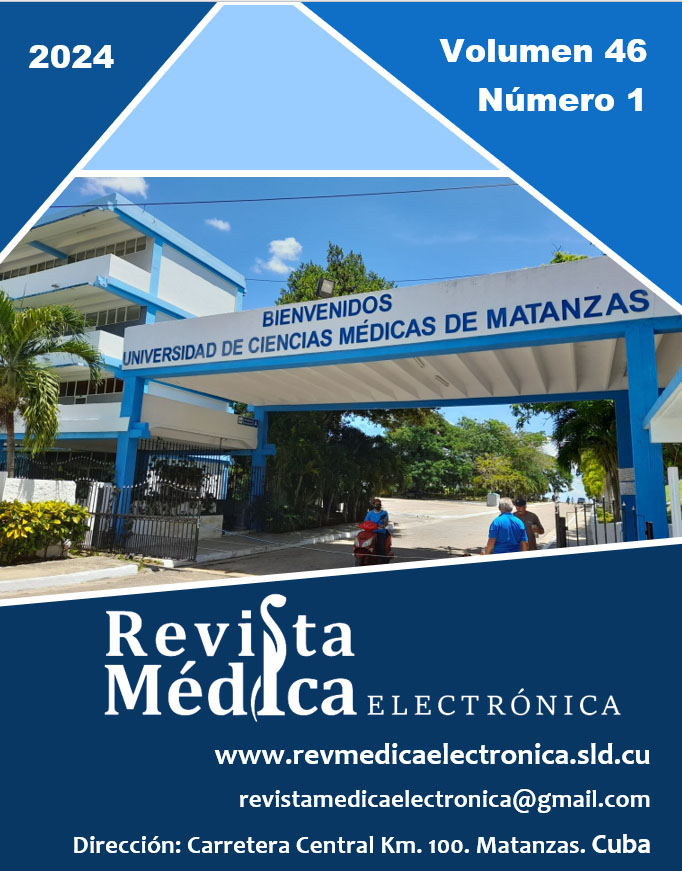mHealth and breast cancer in Pubmed: scientific production in the period 2018-2022
Keywords:
journal article, bibliometrics, health sciences, health research evaluation, researchersAbstract
Introduction: Advances in mobile health and its applicability in different areas of public health have evolveed significantly in recent years, including breast cancer.
Objective: To describe the scientific production in mHealth and breast cancer included in PubMed in the period 2018-2022.
Methods: Descriptive study with quantitative approach of non-experimental design. A search was carried out in PubMed on mHealth and breast cancer using the descriptors “mobile health” OR “mobile health technologies” OR “mobile health app” OR “mHealth” OR “mHealth app” AND “breast cancer”, in the five-year period 2018-2022. Knowledge maps of co-authorship and author keywords were generated by VOSviewer V. 1.6.18 software.
Results: The most representative writers were Dr. Manuel Arroyo-Morales, Dr. Irene Cantarero-Villanueva, Dr. Noelia Galiano Castillo, and Dr. Mario Lozano-Lozano. On the other hand, the leading journals with greater productivity in the subject are JMIR mHealth and uHealth, JMIR Cancer, and Journal of Cancer Survivorship.
Conclusions: The analyzed works were focused on supervised rehabilitation compared to that supported with mobile applications, exercise prescription in survivors, monitoring of energy balance, quality of life, and cognitive function, among others. In the same way, the leading journals present quartiles Q1 and Q3 in the Scimago Journal & Country Rank.
Downloads
References
2. Tarricone R, Petracca F, Ciani O, et al. Distinguishing features in the assessment of mHealth apps. Expert Rev Pharmacoecon Outcomes Res. 2021;21(4):521-6. DOI: 10.1080/14737167.2021.1891883.
3. Kageyama I, Kurata K, Miyashita S, et al. A bibliometric analysis of wearable device research trends 2001-2022-A study on the reversal of number of publications and research trends in China and the USA. Int J Environ Res Public Health. 2022;19(24):16427. DOI: 10.3390/ijerph192416427.
4. Taj F, Klein MCA, van Halteren A. Digital health behavior change technology: Bibliometric and scoping review of two decades of research. JMIR MHealth UHealth. 2019;7(12):e13311. DOI: 10.2196/13311.
5. De-la-Fuente-Robles YM, Ricoy-Cano AJ, Albín-Rodríguez AP, et al. Past, Present and Future of Research on Wearable Technologies for Healthcare: A Bibliometric Analysis Using Scopus. Sensors (Basel). 2022;22(22):8599. DOI: 10.3390/s22228599.
6. Lim JY, Kim Y, Yeo SM, et al. Feasibility and usability of a personalized mHealth app for self-management in the first year following breast cancer surgery. Health Informatics J. 2023;29(1):14604582231156476. DOI: 10.1177/14604582231156476.
7. Shi N, Wong AKC, Wong FKY, et al. Mobile health application-based interventions to improve self-management of chemotherapy-related symptoms among people with breast cancer who are undergoing chemotherapy: A systematic review. Oncologist. 2023;28(4):e175–82. DOI: 10.1093/oncolo/oyac267.
8. Martínez de Armas RJ. Producción científica sobre el envejecimiento saludable indizada en la base de datos Medline, en el período 2019-2021. Bibliotecas Anales de investigación [Internet]. 2022 [citado 07/07/2023];18(2):1-10. Disponible en: http://revistas.bnjm.cu/index.php/BAI/article/view/486/472
9. Lotka AJ. The frecuency distribution of scientific productivity. J Wash Acad Sci [Internet]. 1926 [citado 15/07/2023];16(12):317-23. Disponible en: https://archive.org/details/journalofwashin161926wash/page/n373
10. Wang M, Chai L. Three new bibliometric indicators/approaches derived from keyword analysis. Scientometrics. 2018;116(2):721-50. DOI: 10.1007/s11192-018-2768-9.
11. Alsharif AH, Salleh NZMD, Baharun R. Research trends of neuromarketing: A bibliometric analysis. Journal of Theoretical and Applied Information Technology [Internet]. 2020 [citado 07/07/2023];98(15):2948-62. Disponible en: http://www.jatit.org/volumes/Vol98No15/6Vol98No15.pdf
12. Alsharif AH, Salleh NZM, Baharun R. To better understand the role of emotional processes in decision-making. Int J Acad Res Econ Manag Sci. 2021;10(2):43-52. DOI: 10.6007/ijarems/v10-i2/9883.
13. Comerio N, Strozzi F. Tourism and its economic impact: A literature review using bibliometric tools. Tourism Econ. 2019;25(1):109–31. DOI: 10.1177/1354816618793762.
14. Alsharif AH, Salleh NZM, Baharun R, et al. Neuroimaging techniques in advertising research: Main applications, development, and brain regions and processes. Sustainability. 2021;13(11):6488. DOI: 10.3390/su13116488.
15. Alsharif AH, Salleh NZM, Baharun R, et al. A global research trends of neuromarketing: 2015-2020. Rev Comun [Internet]. 2022 [citado 07/07/2023];21(1):15-32. Disponible en: https://www.redalyc.org/articulo.oa?id=589470678002
16. van Eck NJ, Waltman L. Software survey: VOSviewer, a computer program for bibliometric mapping. Scientometrics. 2010;84(2):523-38. DOI: 10.1007/s11192-009-0146-3.
17. Hou IC, Lin HY, Shen SH, et al. Quality of life of women after a first diagnosis of Breast Cancer using a self-management support mHealth app in Taiwan: Randomized controlled trial. JMIR MHealth UHealth. 2020;8(3):e17084. DOI: 10.2196/17084.
18. Ainsworth MC, Pekmezi D, Bowles H, et al. Acceptability of a mobile phone app for measuring time use in breast cancer survivors (life in a day): Mixed-methods study. JMIR Cancer. 2018;4(1):e9. DOI: 10.2196/cancer.8951.
19. Phillips SM, Courneya KS, Welch WA, et al. Breast cancer survivors’ preferences for mHealth physical activity interventions: findings from a mixed methods study. J Cancer Surviv. 2019;13(2):292-305. DOI: 10.1007/s11764-019-00751-3.
20. Halim Z, Khan S. A data science-based framework to categorize academic journals. Scientometrics. 2019;119:393-423. DOI: 10.1007/s11192-019-03035-w.
21. Sazzed S. Association between the rankings of top Bioinformatics and Medical Informatics journals and the scholarly reputations of chief editors. Publications. 2021;9(3):42. DOI: 10.3390/publications9030042.
22. Tas F. An analysis of the most-cited research papers on oncology: which journals have they been published in? Tumour Biol. 2014;35(5):4645-9. DOI: 10.1007/s13277-014-1608-7.
23. Şanlı AN. Update of the 100 Most Cited Articles on Breast Cancer: A Bibliometric Analysis. Eur J Breast Health. 2022;18(3):258-70. DOI: 10.4274/ejbh.galenos.2022.2022-3-8.
24. Dhar E, Bah AN, Chicchi Giglioli IA, et al. A scoping review and a taxonomy to assess the impact of mobile apps on cancer care management. Cancers (Basel). 2023;15(6):1775. DOI: 10.3390/cancers15061775.
25. Fuentes A, Amat C, Lozano-Rubí R, et al. MHealth technology as a help tool during breast cancer treatment: A content focus group. Int J Environ Res Public Health. 2023;20(5):4584. DOI: 10.3390/ijerph20054584.
Downloads
Published
How to Cite
Issue
Section
License
All content published in this journal is Open Access, distributed under the terms of the CC BY-NC 4.0 License.
It allows:
- Copy and redistribute published material in any medium or format.
- Adapt the content.
This will be done under the following terms:
- Attribute the authors' credits and indicate whether changes were made, in which case it must be in a reasonable way.
- Non-commercial use.
- Recognize the journal where it is published.
The copyrights of each article are maintained, without restrictions.






